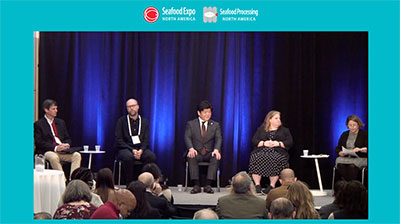Moving from Traceability to Transparency: Diverse Stakeholders Driving Seafood Transparency Expansion
Moderator:
Sally Yozell, Stimson Center
Speakers:
Alexa Cole, NOAA Fisheries
Wakao Hanaoka, Seafood Legacy
Andy Hickman, Seafood Ethics Action (SEA) Alliance
Dr. John Virdin, Director, Duke University
A lack of transparency pervades the seafood supply chain at every level, across both industrial and artisanal fishing, and aquaculture, impeding effective fish stock management and enforcement against illegal, unreported and unregulated (IUU) fishing, as well as fair labor practices. The opaque nature of the seafood supply chain heightens the risk that distant water fleets, small-scale fishers, processors, and fishing companies may engage in IUU fishing and seafood fraud. Consumers want to know that the fish they purchase is not part of illicit activities, labor abuses or undermining seafood sustainability. Recognizing that transparency must be broadly adopted throughout the seafood supply chain at all levels, there has been growing engagement by a wide set of international stakeholders. This panel will explore changes in the market expectations and the latest efforts to expand seafood transparency by civil society, industry, and government. It will also highlight new findings and recommendations from a forthcoming comparative study of transparency initiatives adopted in non-seafood sectors that can offer valuable lessons to increase the reach and effectiveness of seafood transparency initiatives. To combat IUU fishing and gain a greater understanding of the seafood industry’s impact on fisheries sustainability, labor practices, and the economic security of coastal states, there is a growing demand for publicly available information about fishing industry practices and operations.






